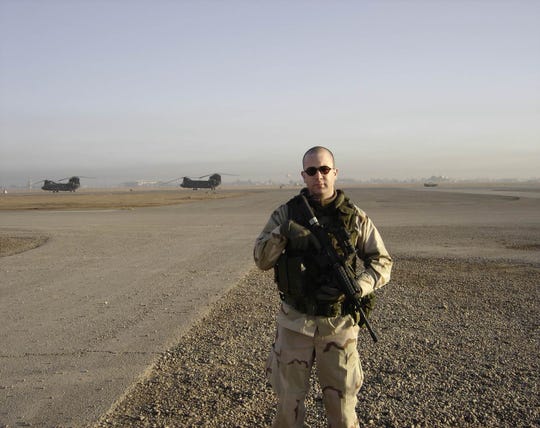I went to war in the Middle East. I know the haunting look in the eye of nurses battling COVID.
In the fall and winter of 2020, as COVID cases rose quickly and every day seemed to set a new all-time high, nurses took to Twitter to post photos of themselves after working 12-hour shifts. Some used a version of the “How it started. How it’s going” meme: the first photo a smiling fresh-faced nursing school graduate, the second a worn shell, cheeks hollow and faces bruised from constant wear of tight N95 masks.
And most haunting, the look in their eyes. There is knowledge there, and a dried exhaustion that lies beyond suffering.
I’m sure I wasn’t the only combat veteran to think “I know that look.” I’ve seen it before. One day in particular sticks in my mind, a summer afternoon in Iraq in 2006, when a crew of mine got back from a mission and walked in our command center covered in femoral blood. An improvised explosive device had hit the Humvee ahead of them, and my team had been first to apply the tourniquets. Three legs off two men. When a soldier looks at you with those eyes you stand them down and put them in the shower and tuck them in bed and let them sleep around the clock because inside they are nothing but ash.
How’s it going? Not well.
CNN interviewed one nurse who posted the meme, a woman named Kathryn, who said:
“I think at this point we’ve gone numb. We’ve been through a couple of surges … and we are fully expecting the next few weeks to be brutal and at this point, honestly, we just want to get it over with. We know it’s going to be awful, we know that people are going to die, and there’s nothing else we can do at this point other than get through it.”
Sounds like many a soldier nine months into an extended tour in Iraq or Afghanistan.
After 32 million cases and almost 590,000 deaths, there is light at the tunnel. We can see the end, as the vaccine is rolling out fast and America can once again imagine a world not entirely guided by COVID precautions.
David Mastio and Jill Lawrence on Biden’s speech to Congress: Liberal road to ruin or popular fixes to festering problems?
And when that happens, when this pandemic ends, we as a country need to be ready to welcome home the health care workers coming back from the war.
Brian Castner in Camp Victory, Baghdad, in January 2005. (Photo: Family handout)
Many of these similarities — between a soldier coming home from combat, and a doctor or nurse coming home from the frontlines of COVID — may seem obvious. Both faced mass death and personal danger, their own mortality embodied in the corpses surrounding them. And powerless to “win” their war themselves, many give over to a grim daily survival. “A bad day is when people are dying and you can’t do anything to stop it,” Kathryn told CNN. A pandemic, like a war, is good at teaching humility, and the limits of human agency.
Home alone
But there are less obvious parallels, especially in experiences still to come, and these are the ones that we as a society need to be prepared to confront with them.
Because for some, the homecoming will be literal. Travel nurses who backfilled overwhelmed hospitals across the country are returning to their communities alone. No one at home that shared their experience, no obvious sources of camaraderie, no one to commiserate with, not even the equivalent of an American Legion or Veterans of Foreign Wars to join.
And then there is a lingering disenchantment, with the institutions of government and a politics that poisoned the well, a national bickering that worked at odds with one’s best local efforts. Veterans heard that the Iraq War would take months, nurses heard that the pandemic could be over by Easter — last Easter. Neither soldiers nor health care workers got enough protective equipment — armored vehicles or N95 masks. So no matter how many wins one has at the tactical level, the nation fails them at the strategic.
Biden’s first 100 days: With COVID vaccinations, he should practice unity, not preach it
And finally, and perhaps hardest to shake, the feeling that the most important thing you will ever do with your life has already happened. That nothing that comes later will compare, an empty future of low stakes. Every day that you fought the pandemic was dangerous and disheartening, but it was also undeniably important, constant front page news and the focus of the world. Setting a broken bone from a fall off a bike isn’t the same. Handing out nutrition pamphlets rather than vaccines isn’t the same. So you feel burned out, but also don’t know what to do next.
Travel nurse Thu Nguyen catches her breath inside the ICU unit at Providence Holy Cross Medical Center in Los Angeles on Tuesday, Feb. 9, 2021. Nurses are required to wear PPE for hours at a time while working with patients, sometimes causing bruises or scars around their eyes and nose. (Photo: Harrison Hill, USA TODAY)
Dislocated, disillusioned, demotivated. Lost. Not to mention the potential post-traumatic stress that millions of workers will notice as the years go by.
A trauma-informed community
But there are things we can do as a society, lessons we’ve learned from producing new combat veterans for the last 20 years, so we can welcome home these women and men. Things we can all do, one-on-one, not as a big government program, but personally with the health care workers we know in the course of our own lives.
First, we need to communicate that if they feel this way, if this experience and perspective rings true, then they should know they are not alone. These are old feelings. The oldest of feelings. Three thousand years of war literature, and yet the disassociation feels new for every soldier coming home today.
I had many struggles when I came home from Iraq. I was lost. And I did many things to try to relieve that sense of grief adrift. Some were healthy, like yoga, and some were not. But in the midst of it, even when I was in talk therapy at my local Veterans Affairs hospital, no one ever told me it gets better. No one ever said that there was an end. That I would find peace, and community and labor as meaningful as what I had done before. That there were mountains yet unclimbed as satisfying as any I had yet scaled. Knowing that the exhausted aimlessness would eventually end would have been a comfort at the time.
Brian Castner in the Udairi Training Range, Kuwait, in May 2006. (Photo: Family handout)
Which leads to a final practical step. Those coming home from fighting COVID should maintain the connections they have, but if loneliness and isolation set in, then know that the community of the “trauma-informed” is bigger than you imagine. Veterans know this experience, but there are more who have done difficult and dangerous work. I was in Liberia during the Ebola outbreak in 2015, and saw the same look in the eyes of nurses there.
Rather than pathologize the stress and anxiety, turn to a community that “gets it.” We will struggle together.
Brian Castner is a former explosive ordnance disposal officer and the author of the war memoir “The Long Walk.” His new book is “Stampede.”
You can read diverse opinions from our Board of Contributors and other writers on the Opinion front page, on Twitter @usatodayopinion and in our daily Opinion newsletter. To respond to a column, submit a comment to [email protected].
Source: Read Full Article


